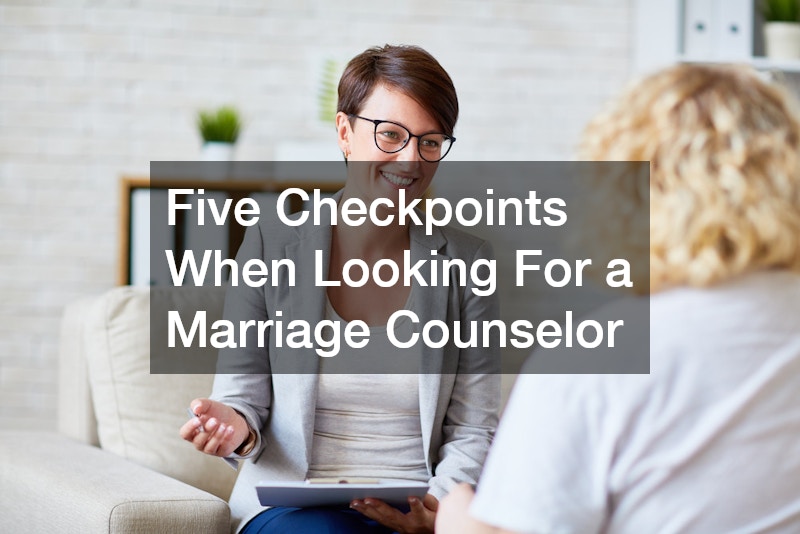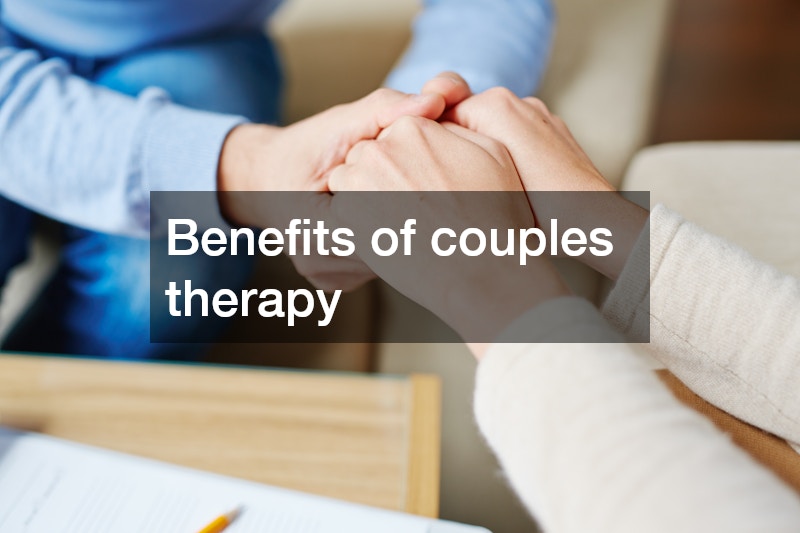Five Checkpoints When Looking For a Marriage Counselor


One study by the American Association of Marriage and Family Therapists found that of those who people who participated in couples therapy, 98% felt that they had received good or even excellent help from their therapist. About 97% of survey respondents felt that they had received the help they needed to heal their relationship. If you are having trouble with your partner, you might be looking into therapists. As you’ll find, there are many varieties to choose from: family counseling; psychotherapy; couples counseling; and individual counseling. The right one for you may not be a clear choice.
If you are experiencing anxiety, or are trying to work through past trauma, you might decide that therapy on an individual basis would benefit you. Or maybe the problems in your relationship are troubling you the most, and you want to work on that first.

Benefits of Couples Therapy
Seeking a couples therapist can be a pivotal step in strengthening your relationship. One of the key benefits is improved communication. A therapist provides a neutral environment where both partners can openly express their thoughts and feelings without fear of judgment. This process helps to uncover underlying issues and teaches couples how to communicate more effectively, fostering mutual understanding and empathy.
Another advantage is conflict resolution. A skilled therapist helps couples navigate difficult situations, teaching them healthier ways to address and resolve disagreements. This reduces the emotional toll of conflicts and strengthens the bond between partners.
Couples therapy also promotes emotional growth. As each partner gains insights into their behavior and emotional responses, they can work on personal growth, leading to a more harmonious relationship. Additionally, therapy helps in rebuilding trust, particularly after instances of betrayal or infidelity.
Lastly, couples therapy can prevent future problems by equipping partners with tools to handle challenges proactively. With guidance, couples learn how to maintain a healthy, long-lasting relationship. Investing in therapy is an investment in the future of your partnership, ensuring a stronger connection built on trust, respect, and effective communication.
Now, check out these five key tips for finding the best couples therapy professional for you and your partner.
Even Good Therapists Aren’t Miracle Workers: Doing Your Part.
Before you begin your search, remember that therapy only works if you do. This means that both your partner and you need to comply with any guidance the counselor gives, such as practices or “homework.” It is also vital that both you and your partner feel comfortable with the counselor, and feel that you can speak openly and honestly about the issues in your relationship.
How to Look For Therapists: Your Quick Start Guide.
1. Do a search on your web browser.
-
- Anyone with an internet connection can find a result in a tenth of a second. The list of couples therapists in your area will be long to start with, but this is good as you’re going to shorten the list with specific criteria. It might also be helpful to ask for recommendations from close friends or family, if you feel comfortable revealing that you are in fact actively looking for a marriage counselor.
2. Location, Location: Where They Are Located Matters.
-
- If you end up feeling comfortable with this therapist, are they in a good spot? Meaning, will it be a hassle to regular visit their office? You don’t want to have a reason to dread seeing your therapist. A location that is fairly far away, or one that would be difficult to get to during rush hour traffic, will make it difficult to stick with the therapy.
3. Availability: When and How Often Can They See You?
-
- Some couples may wish to see their therapist a couple of times a month. Others might prefer a biweekly arrangement. And still others may think that their therapist wants them to come in for too many sessions. It is helpful to know your preference, as well as that of your partner, before beginning sessions.
4. How Do They Make You Feel?
-
- It might sound odd, but both you and your partner need to be able to speak openly in front of a therapist, which means you’ll both need to have trust in them. If one of you doesn’t feel that way, then there is a good chance that therapy will not be as helpful as you had wished. So take the time to check in with yourself during the initial consultation and see how you feel about the person as your marriage counselor.
5. Professional Check-Offs.
- It is important that you ensure the therapists you speak to have the appropriate education, with a degree by an accredited program. The therapist must also be licensed by the state, and/ or the American Marital and Family Therapy Regulatory Boards, or AMFTRB. A nice added bonus is if they belong to any professional organizations as well.
Therapy is not only an option for possibly improving your romantic relationships. About 93% of patients who recently worked with a marriage counselor reported that they now have the right tools to deal with their problems, but they also claimed to be in better physical health, and to be performing better at their jobs. Couples therapy might work for you and your partner, but first you need to find the right counselor.